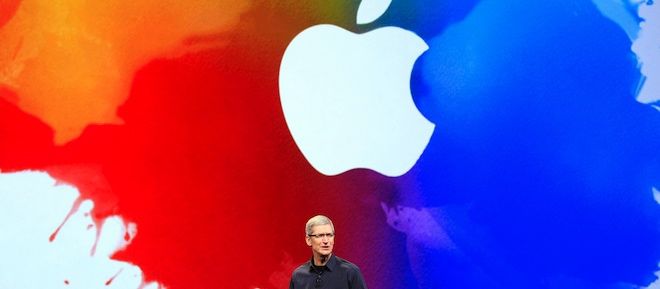Tim Cook’s more mature Apple
Stock dividends are the latest sign that Steve Jobs’ era is over
Share

If Apple was a woman, she would be one of those heavenly goddesses whom time does not touch. One of those creatures whose hair never grays, whose skin never ages and whose generous endowments seem to be completely unaffected by the laws of gravity with which the rest of us have to contend. In other words, one of those women most other women hate.
That pretty much sums up how unnaturally youthful Apple looks for its age—and how the competition feels about it. As Nick Wingfield wrote in the New York Times this morning, Apple has been on a “growth spurt” that’s very unusual for a company that’s three-and-a-half decades old.
One sign of aging emerged this morning, though, when the tech behemoth announced that, for the first time since 1995, it would pay a stock dividend. Handing stockholders cash is lady-like behaviour—one of those things slow-growing giants like Microsoft, Hewlett-Packard and IMB do, but that Apple, the hot chick on the block for years now, had refused to.
Today’s announcement didn’t affect Apple’s share price much, probably because investors widely expected the company would start rewarding shareholders after the death of Steve Jobs, who’d always resisted calls to give out dividends. According to the Financial Times, that’s because:
The Times has put it in less forgiving terms, saying that Jobs: “treated investors as if they were biohazards.”
The decision to introduce the dividends, then, is the latest sign that Tim Cook is turning Apple into a kinder, milder, more mature company. It was only a couple of months ago that the new CEO published the list of Apple’s global suppliers––previously a closely guarded secret–and pledged to hold them accountable to higher human rights and labour standards, an issue his predecessor notoriously refused to address.
The dividend payouts represent a similar U-turn in attitude. True, analysts and journalists are already complaining that a quarterly dividend of $2.65 a share—equivalent to a 1.8 per cent yield—is stingy for a company that’s been hoarding record amounts of cash for years. Apple is sitting on $100 billion and is expected to have a $40 billion cash flow this year alone, according to Business Insider. Together with a planned share repurchase worth $10 billion, the dividend program is expected to cost the company “only” $45 billion over three years, which will likely allow Apple to grow its pile of money even past current levels.
But… there are a couple of important buts. First of all, most of Apple’s cash is held by foreign subsidiaries, and the company would have to repatriate it in order to use it for dividends. To do so, Apple would incur a hefty tax, likely 30 per cent according to the Times, something Cook said today is out of the question. (In its domestic coffers, Apple has about $34 billion.)
Second, no corporate giant–no matter how mighty–should take its fortunes for granted. Apple may soon need lots of cash to buy out “hundreds of brilliant young companies, hoping to bring into [its] fold the one that would have killed [it] down the road,” as the Financial Times put it, somewhat poetically, in the Lex Column today. In the world of technology companies the tables turn fast, and Apple already faces a serious threat from competitors trying to nibble away at the lower-end share of the consumer market with cheaper versions of the i-gizmos.
Cook’s decision on dividends isn’t stingy–it’s sensibly conservative.